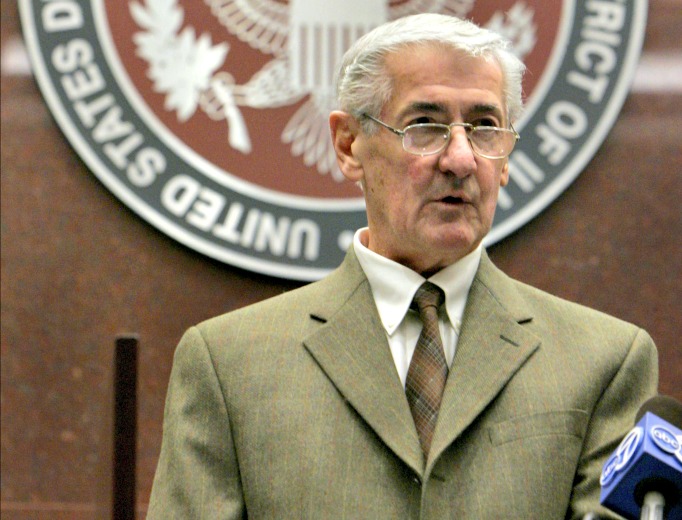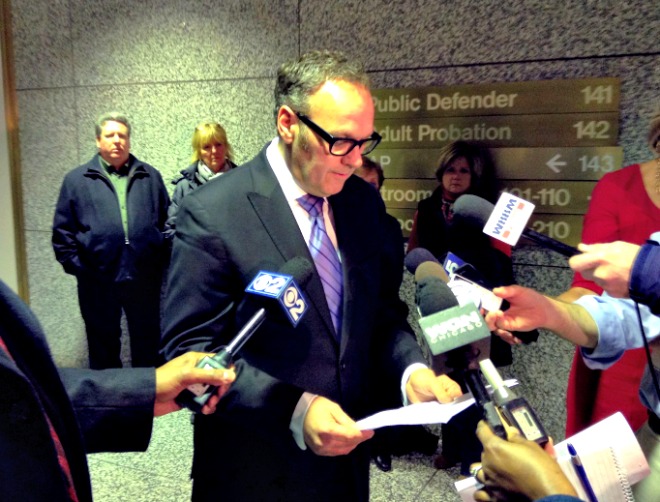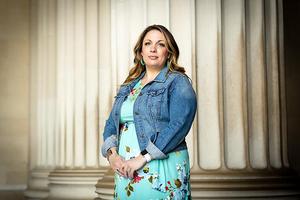Chicago Court Upholds Parish’s Dismissal of Employee in Same-Sex Relationship
Faced with lawsuits filed by employees fired for violating Church teaching, Catholic parishes and schools are relying successfully on a landmark 2012 U.S. Supreme Court decision.

CHICAGO — When a U.S. district court ruled against a parish music director who sued the Chicago Archdiocese after he announced plans to wed his same-sex partner and was fired by his employer, the decision did not surprise legal analysts.
The plaintiff, Colin Collette, had served as an employee of Holy Family Church for 17 years, and he claimed that the parish and Chicago Archdiocese violated federal statutes that barred discrimination based on sexual orientation and sought to return to his job and collect damages and legal fees.

But U.S. district Judge Charles Kocoras dismissed Collette’s suit in a decision that acknowledged the constitutional right of church-affiliated institutions to retain control over employment decisions tied to their religious mission.
The Supreme Court has “recognized the right of religious organizations to control their internal affairs,” said Kocoras in a reference to the high court’s 2012 decision EEOC v. Hosanna-Tabor, which upheld the “ministerial exception” — the right of church-affiliated institutions to hire people responsible for advancing their religious mission without interference from the courts.
Gerard Bradley, a specialist on the U.S. Constitution at the University of Notre Dame Law School, said the ruling was in keeping with a “general trend.”
“This Chicago decision is a good indication of the general … trend in cases applying the ‘ministerial exception’ to persons involved in any significant way in planning liturgy,” Bradley told the Register.
Douglas Laycock, a leading analyst on religious-freedom issues at the University of Virginia Law School, echoed that assessment.
“No surprise here,” Laycock told the Register. “Chicago is in the Seventh Circuit, which has held that those who lead or play music at the worship service are ministers for purposes of the ministerial exception.”
The outcome of the Chicago case highlights the strength of a religious-liberty defense securely grounded in the ministerial exception.
When employee contracts confirm that an individual was hired to advance and secure a Catholic institution’s religious mission, and then that individual publicly rejects a core teaching of the faith, their actions will both provide a compelling case for dismissal and help shield the employer in future litigation.
Interpreting the Exception
But five years have passed since the Supreme Court unanimously affirmed the right of Hosanna-Tabor, a Lutheran school, to hire employees who embrace its religious teachings. And rapidly shifting legal and cultural currents have complicated the work of lawyers defending the Church in lawsuits filed by employees who have been fired or did not have their contracts renewed.
Many district courts have adopted a narrow standard for interpreting the ministerial exception, even as Catholic institutions react to fresh challenges, such as employees sharing personal information on social media, or growing support for same-sex “marriage” among mainstream Catholics, following the Supreme Court’s landmark decision to strike down state laws defining marriage as a union of one man and one woman.
Kerry Lavelle, Colin Collette’s attorney, tapped into the nation’s changing social norms in her harsh reaction to the judge’s dismissal of the case.
In a June 7 statement released after the ruling, Lavelle asserted that the Church had “chosen to stand behind its ministerial exception to discriminate against members of the gay community.”
Since then, New Ways Ministry, an “LGBT” outreach group that has challenged Catholic teaching on homosexual relationships and consequently has been prohibited by the U.S. bishops from representing itself as Catholic or speaking on behalf of Catholics, has also registered its support for Collette. Further, New Ways has pressed the Chicago Archdiocese to reassess the decision to fire Collette — a decision defended by the late Cardinal Francis George.
“Regardless of what the court said,” Francis DeBernardo, editor of New Ways Ministry’s blog, told the Register, “I believe the Archdiocese of Chicago should rehire Colin Collette because of a moral imperative to treat people equally. No church employee anywhere is following Church teaching 100%, so to single out one sort of infraction against Church teaching is not right.”
In fact, employees at Catholic and Christian institutions have been fired for openly violating doctrinal teachings that bar abortion, premarital sex and assisted reproduction, as well as legal unions between same-sex partners.
And, despite the unanimous decision in Hosanna-Tabor, religious employers, especially schools, have not always prevailed.
Indiana and Massachusetts Cases
In 2014, a federal grand jury ruled that the Diocese of Fort Wayne-South Bend, Indiana, and St. Vincent de Paul School had violated federal law barring discrimination based on sex when it did not renew a teacher’s contract after she confirmed that she was using in vitro fertilization to conceive a child. The diocese was ordered to pay almost $2 million in damages and medical expenses to the former employee, who had served as a junior-high language-arts teacher and signed a contract that included a “morals clause.”
In another recent decision, the Massachusetts Superior Court ruled in favor of Matthew Barrett, a food services manager who had an offer of employment rescinded by Fontbonne Academy, a Catholic girls preparatory school in Milton, after he identified his same-sex partner as his “husband” in an emergency contact form.
The school is sponsored by the Sisters of St. Joseph of Boston, but some of its graduates attacked its actions against Barrett on social media, and the judge ruled in a 2015 decision that Fontbonne’s insistence on a blanket ministerial exception did not pass muster.
Legal specialists note that the South Bend and Massachusetts school cases have something in common — plaintiffs who did not play an explicitly religious role at a Catholic school.
“The courts have generally been unsympathetic to the assertion, by dioceses especially, that each and every teacher is required to live an exemplary life and to personify the Christian virtues,” said Bradley.
“Courts seem to think — and there is some basis for thinking this way in the Hosanna-Tabor case itself — that … simple daily witness to the faith is not enough to qualify for the ministerial exception.”
Broadening the Scope
Similar lawsuits alleging discrimination have been filed across the country and are moving through the courts.
But while the Seventh Circuit refused the Diocese of South Bend’s petition to appeal the lower court ruling, another case that was heard by the Sixth Circuit has actually broadened the scope of the ministerial exception to include “parachurch” organizations.
In Conlon v. InterVarsity Christian Fellowship/USA, Alyce Conlon, a former spiritual director at InterVarsity Christian Fellowship (IVCF), filed a lawsuit after she was fired in December 2011, allegedly for “failing to reconcile her marriage.”
Her lawyers argued that her termination violated federal statutes barring discrimination based on sex, in part, because two male colleagues who faced similar marital issues reportedly had not been fired, but the circuit court rejected this claim.
“Because IVCF is a religious organization and Conlon was a ministerial employee, IVCF’s decision to terminate her employment cannot be challenged under federal or state employment discrimination laws,” stated the Sixth Circuit in a 2015 ruling that was grounded in the Hosanna-Tabor decision.
“It matters not whether the plaintiff is claiming a specific violation under Title VII or any other employment discrimination statute.”
Religious-liberty observers are now awaiting the outcome of another important case before the Second Circuit that involves a Catholic school principal who sued the New York Archdiocese after she was fired from her job for “insubordination.”
The former principal has insisted “that she was not a minister,” Laycock noted. “I’m pretty sure she’s going to lose. But it illustrates that employees and their lawyers are willing to keep pushing against the ministerial exception.”
In oral arguments before the Second Circuit, the principal’s lawyer argued that her role was secular, not ministerial, and the state had the right to intervene in the internal affairs of “private” schools that mostly taught “secular” subjects during the school day.
Eric Rossbach, a lawyer for the Becket Fund for Religious Liberty, a public interest group that represented the New York Archdiocese and St. Anthony’s Catholic School in the case, challenged these claims and listed the principal’s many religious duties, from leading the school community in daily prayer to supervising classroom religious instruction.
The New York Archdiocese’s lawyers are fighting for a “pretty clear rule: If you are an administrator and supervise ministerial employees, you are also, by definition, a ministerial employee,” Eric Kniffin, the author of Protecting Your Right to Serve: How Religious Ministries Can Meet New Challenges Without Changing Their Witness, told the Register.
“The best thing the Church can do is document and set out in the job description the employee’s religious duties.
“Even better, they should have the employee affirm that they understand they have religious responsibilities in the formal evaluation process required by the school,” said Kniffin.
Bradley agreed with this legal guidance, but also suggested that Catholic school leaders could do more to foster religious engagement across the board.
To overcome the sense that only religion teachers and staff directly involved with prayer and worship should personally support the schools’ mission, said Bradley, dioceses should send the message that every teacher “is part of a team of educators with a joint responsibility to teach the faith.”
Joan Frawley Desmond is a Register senior editor.

















